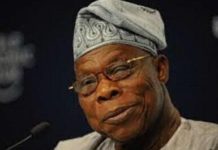October 31 is the day set by Justice Joyce Abdulmalik of the Federal High Court, Abuja, to issue a finding and judgment in a lawsuit that seeks to remove Mr. Chiedu Ebie, the Chairman of the Board of the Niger Delta Development Commission (NDDC), due to an alleged illegal appointment.
Shortly after the parties in the complaint adopted their written addresses as their arguments for and against the originating summons, Justice Abdulmalik set the date for both the ruling and the judgment for Tuesday.
President Bola Tinubu was sued by a few Niger Delta villages for allegedly selecting Ebie as NDDC in violation of the NDDC Act.
Ebie was not competent to hold the position of Board Chairman because he did not originate from “the oil-producing area with the highest quantum of oil production,” according to the plaintiffs from the communities of Bayelsa and Delta States, who testified before the court.
Chief Eddy Brayei, Mr. Jonah Engineyouwei, and Chief Goodnews Gereghewei are among those who filed the lawsuit.
In the Ekeremor Local Government Area of Bayelsa State, they sued on behalf of the communities of Bisangbene, Agge, and Amatu1.
The first through fifth responders are, in order, President Tinubu, Senate President, Attorney-General of the Federation, NDDC, and Ebie.
On the other hand, Friday Ugedi, representing Egbema Kingdom in Delta, Mr. Jolomi Itsekure, representing Itsekiri Oil and Gas producing villages, and Jerry Mulade-Aroh, representing Gbaramatu Kingdom, also requested to be added as plaintiffs in the lawsuit.
During the Tuesday’s hearings, the plaintiffs, represented by Mr. Egberipou Sotonye Barakemi, asked the court to reject the preliminary objection that President Tinubu and the AGF had submitted. They also requested that the court reject all of the respondents’ cases altogether since they were without merit.
In their respective replies, the court was persuaded to dismiss the complaint for lack of jurisdiction by Mrs. Maimuna Lami Ashiru, who was representing President Tinubu and the AGF; Umaru Jibril, who was representing the National Assembly; and Emmanuel Akumaye, who was representing the NDDC and Ebie.
Judge Abdulmalik said that on October 31, this year, she would deliver her decision in the primary suit as well as her finding in the preliminary objection to the suit, following hearing from all parties.
The plaintiffs in the suit filed on January 11, 2024, under the case number FHC/ABJ/CS/28/2024, said that Ebie Chiedu’s appointment as NDDC Board Chairman and President Tinubu’s screening of candidates violated the NDDC Act.
They argued that even though Ebie is from a state that produces oil, he is not competent to serve as chairman of the board because his home state is not among the top oil-producing regions.
The plaintiffs claimed that Ebie’s appointment “was done in error and is against the clear provisions of the law” in the affidavit deposed in support of the lawsuit.
“That the screening and confirmation of the 5th defendant by the Nigerian Senate was also done in error and was against the clear provisions of the law.
“That as a result of the facts above and in particular the facts in paragraphs 2 – 11, the appointment of the 5th defendant is null, void and of no effect”.
The plaintiffs, represented by B. B. Abalaba, had urged the court to rule on Ebie’s eligibility to serve as the chairman of the fourth defendant, the Niger Delta Development Commission, given that he comes from a community with little oil output.
The following questions are also up for debate: Does the first defendant’s selection of the fifth defendant as the fourth defendant’s chairman not violate the NDDC Act?
“Whether the appointment of the 5th defendant by the 1st defendant as the chairman of the 4th defendant is not Illegal null and void?
They therefore prayed the court for an order “setting aside the appointment of the 5th defendant as the chairman of the 4th defendant by the 1st defendant.
“An order of injunction restraining the 5th defendant from assuming office or in any way acting as the chairman of the 4th defendant.
“An order of injunction restraining the 4th defendant from recognizing the 5th defendant as its chairman or allowing him access into its premises for the purpose of beginning or continuing work as its chairman.
“An order of injunction restraining the 5th defendant from holding himself out as the chairman of the 4th defendant”.


![Oil barons, pastors were after Regina Daniels before I married her – Ned Nwoko [VIDEO]](https://puoreports.ng/wp-content/uploads/2024/10/ned-nwoko-218x150.jpg)






